Filter by
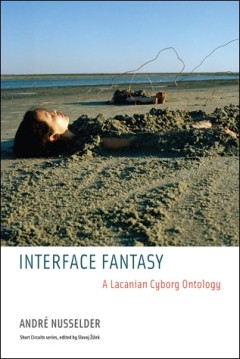
Interface Fantasy: A Lacanian Cyborg Ontology
Behind our computer screens we are all cyborgs: through fantasy we can understand our involvement in virtual worlds.Cyberspace is first and foremost a mental space. Therefore we need to take a psychological approach to understand our experiences in it. In Interface Fantasy, Andre Nusselder uses the core psychoanalytic notion of fantasy to examine our relationship to computers and digital techno…
- Edition
- -
- ISBN/ISSN
- 9780262259095
- Collation
- 1 online resource (xi, 169 pages).
- Series Title
- -
- Call Number
- -
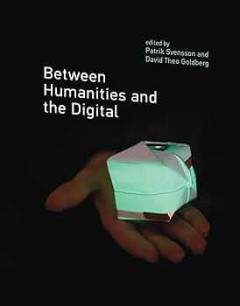
Between Humanities and the Digital
"Like most academic discourses, the Digital Humanities are a conversation in flux. Some would argue that the Digital Humanities are already a well-established field, pointing to the 20-year history of Humanities Computing. Others (me) see a new breed of academic with skills in both technology and the traditional humanities (the Platform Studies and Software Studies series), while others might i…
- Edition
- -
- ISBN/ISSN
- 9780262328364
- Collation
- 1 online resource (xii, 574 pages) :illustrations
- Series Title
- -
- Call Number
- -
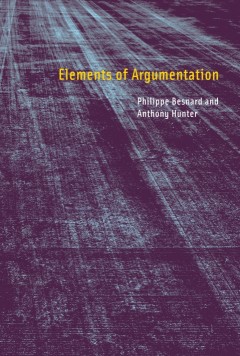
Elements of argumentation
Here the authors introduce techniques for formalizing deductive argumentation in artificial intelligence, emphasising emerging formalizations for practical argumentation. They discuss how arguments can be constructed, how key intrinsic and extrinsic factors can be identified, and how these analyses can be harnessed in the real world.OCLC-licensed vendor bibliographic record.
- Edition
- -
- ISBN/ISSN
- 9780262268400
- Collation
- 1 online resource (298 pages)
- Series Title
- -
- Call Number
- -

Aligning modern business processes and legacy systems :a component-based pers…
Distributed business component computing--the assembling of business components into electronic business processes, which interact via the Internet--caters to a new breed of enterprise systems that are flexible, relatively easy to maintain and upgrade to accommodate new business processes, and relatively simple to integrate with other enterprise systems. Companies with unwieldy, large, and hete…
- Edition
- -
- ISBN/ISSN
- 9780262257138
- Collation
- 1 online resource (xxii, 206 pages) :illustrations.
- Series Title
- -
- Call Number
- -
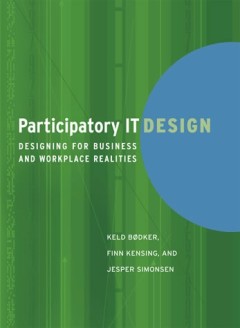
Participatory IT design :designing for business and workplace realities
Title from title screen.Title from book cover on Web Page (viewed Sept. 8, 2005)."The goal of participatory IT design is to set sensible, general, and workable guidelines for the introduction of new information technology systems into an organization. Reflecting the latest systems-development research, this book encourages a business-oriented and socially sensitive approach that takes into cons…
- Edition
- -
- ISBN/ISSN
- 9780262268875
- Collation
- 1 online resource
- Series Title
- -
- Call Number
- -
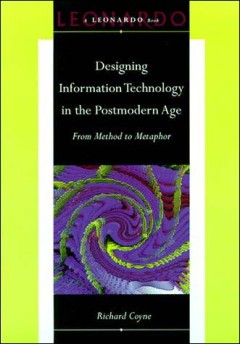
Designing information technology in the postmodern age: from method to metaphor
Designing Information Technology in the Postmodern Age puts the theoretical discussion of computer systems and information technology on a new footing. Shifting the discourse from its usual rationalistic framework, Richard Coyne shows how the conception, development, and application of computer systems is challenged and enhanced by postmodern philosophical thought. He places particular emphasis…
- Edition
- -
- ISBN/ISSN
- 9780262270885
- Collation
- 1 online resource (xiii, 399 pages) :illustrations.
- Series Title
- -
- Call Number
- -
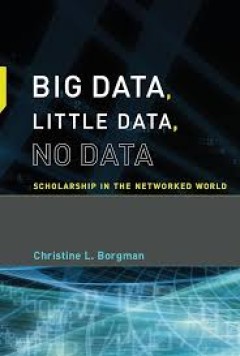
Big Data, Little Data, No Data: Scholarship in the Networked World
An examination of the uses of data within a changing knowledge infrastructure, offering analysis and case studies from the sciences, social sciences, and humanities."'Big Data' is on the covers of Science, Nature, the Economist, and Wired magazines, on the front pages of the Wall Street Journal and the New York Times. But despite the media hyperbole, as Christine Borgman points out in this exam…
- Edition
- -
- ISBN/ISSN
- 9780262327862
- Collation
- 1 online resource (xxv, 383 pages)
- Series Title
- -
- Call Number
- -

Digital work in the planetary market
Understanding the embedded and disembedded, material and immaterial, territorialized and deterritorialized natures of digital work. Many jobs today can be done from anywhere. Digital technology and widespread internet connectivity allow almost anyone, anywhere, to connect to anyone else to communicate and exchange files, data, video, and audio. In other words, work can be deterritorialized at a…
- Edition
- -
- ISBN/ISSN
- 9780262369824
- Collation
- 1 online resource (352 pages).
- Series Title
- -
- Call Number
- -

Scholarship in the digital age :information, infrastructure, and the Internet
Scholars in all fields now have access to an unprecedented wealth of online information, tools, and services. The Internet lies at the core of an information infrastructure for distributed, data-intensive, and collaborative research. Although much attention has been paid to the new technologies making this possible, from digitized books to sensor networks, it is the underlying social and policy…
- Edition
- -
- ISBN/ISSN
- 9780262255783
- Collation
- 1 online resource (xxiv, 336 pages) :illustrations
- Series Title
- -
- Call Number
- -

Transforming enterprise :the economic and social implications of information …
The dot.com bubble may have burst, but information technology continues to transform economic & social activity across all sections of society. This volume explores the changes that are taking place & what impact they will have on the way we live & work.OCLC-licensed vendor bibliographic record.
- Edition
- -
- ISBN/ISSN
- 0262272075
- Collation
- 1 online resource (xii, 534 pages) :illustrations
- Series Title
- -
- Call Number
- -
 Computer Science, Information & General Works
Computer Science, Information & General Works  Philosophy & Psychology
Philosophy & Psychology  Religion
Religion  Social Sciences
Social Sciences  Language
Language  Pure Science
Pure Science  Applied Sciences
Applied Sciences  Art & Recreation
Art & Recreation  Literature
Literature  History & Geography
History & Geography